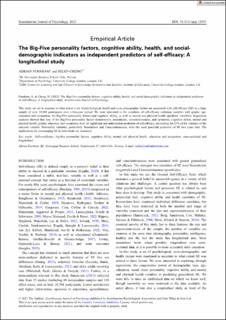| dc.contributor.author | Furnham, Adrian | |
| dc.contributor.author | Cheng, Helen | |
| dc.date.accessioned | 2023-08-29T13:18:44Z | |
| dc.date.available | 2023-08-29T13:18:44Z | |
| dc.date.created | 2023-08-09T10:53:38Z | |
| dc.date.issued | 2023 | |
| dc.identifier.citation | Scandinavian Journal of Psychology. 2023, . | en_US |
| dc.identifier.issn | 0036-5564 | |
| dc.identifier.uri | https://hdl.handle.net/11250/3086235 | |
| dc.description.abstract | This study set out to examine to what extent a set of psychological, health and socio-demographic factors are associated with self-efficacy (SE) in a large sample of over 12,000 participants over a two-year period. We were interested in the correlates of self-efficacy (criterion variable) with gender, age, education and occupation, the Big-Five personality factors and cognitive ability, as well as mental and physical health (predictor variables). Regression analyses showed that four of the Big-Five personality factors (extraversion, neuroticism, conscientiousness, and openness), cognitive ability, mental and physical health, gender, education and occupation were all significant and independent predictors of self-efficacy, accounting for 23% of the variance of the outcome variable. Personality variables, particularly Neuroticism and Conscientiousness, were the most powerful predictors of SE two years later. The implications for encouraging SE in individuals are discussed. | en_US |
| dc.language.iso | eng | en_US |
| dc.publisher | Wiley | en_US |
| dc.rights | Navngivelse 4.0 Internasjonal | * |
| dc.rights.uri | http://creativecommons.org/licenses/by/4.0/deed.no | * |
| dc.subject | self-confidence | en_US |
| dc.subject | big-five personality factors | en_US |
| dc.subject | cognitive ability | en_US |
| dc.subject | mental and physical health | en_US |
| dc.subject | education and occupation | en_US |
| dc.subject | ross-sectional and longitudinal | en_US |
| dc.title | The Big-Five personality factors, cognitive ability, health, and social-demographic indicators as independent predictors of self-efficacy: A longitudinal study | en_US |
| dc.title.alternative | The Big-Five personality factors, cognitive ability, health, and social-demographic indicators as independent predictors of self-efficacy: A longitudinal study | en_US |
| dc.type | Peer reviewed | en_US |
| dc.type | Journal article | en_US |
| dc.description.version | publishedVersion | en_US |
| dc.rights.holder | The Authors | en_US |
| dc.source.pagenumber | 8 | en_US |
| dc.source.journal | Scandinavian Journal of Psychology | en_US |
| dc.identifier.doi | 10.1111/sjop.12953 | |
| dc.identifier.cristin | 2165830 | |
| cristin.ispublished | true | |
| cristin.fulltext | original | |
| cristin.qualitycode | 1 | |

